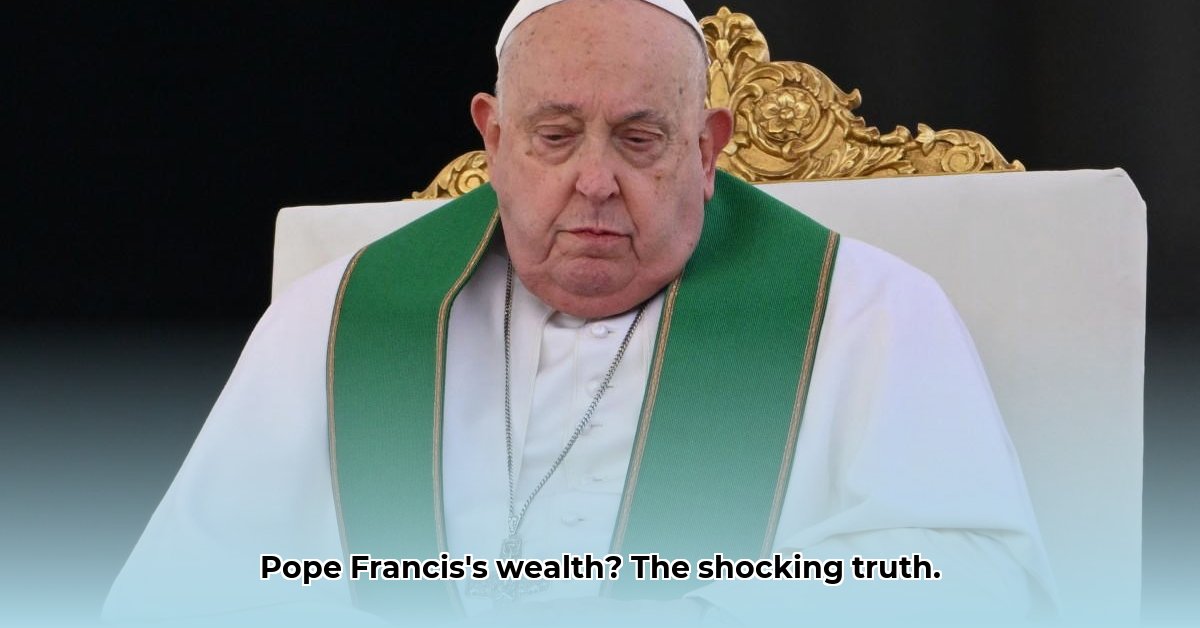
The image of Pope Francis, often depicted in simple attire and known for his personal frugality, is frequently juxtaposed with the Vatican's substantial wealth. While some sources claim his personal net worth is a mere $100, the Vatican City State boasts billions in assets, encompassing real estate, art collections, and investments. This stark contrast raises a compelling question: how can a leader embodying such personal humility preside over an institution possessing such significant wealth? This article delves into the complexities of this paradox, exploring the discrepancies, ethical considerations, and the varying interpretations of "wealth" in this unique context.
Pope Francis's Personal Finances: A Life of Voluntary Simplicity
Pope Francis's personal finances are strikingly modest. Beyond the frequently cited $100 figure, his lifestyle reflects a deliberate rejection of material wealth. He resides in a modest apartment, eschews lavish meals, and consistently donates any extra funds he receives to charitable causes. This commitment to simplicity is not merely personal preference but a deeply held conviction, symbolic of his dedication to serving others rather than accumulating personal possessions. This intentional poverty serves as a powerful counterpoint to the Vatican's considerable wealth. But how does this personal frugality align with the institutional wealth he oversees?
The Vatican's Financial Holdings: A Complex Tapestry of Assets
The Vatican's financial landscape is far more intricate than the Pope's personal accounts. It encompasses a vast array of assets, including:
- The Vatican Museums: Home to priceless works of art and artifacts, representing centuries of accumulated cultural heritage and significant monetary value.
- Real Estate Holdings: Extensive properties in Rome and globally, generating substantial income and holding considerable market value.
- Investments: A diversified portfolio encompassing various financial instruments, contributing to the Vatican's overall financial strength.
Precisely quantifying the Vatican's total net worth remains challenging. The intricate nature of its financial structure, combined with historical opacity in financial reporting, hampers accurate valuation. However, estimates consistently place the Vatican's assets in the billions of dollars, highlighting a significant disparity with the Pope's personal wealth. Does this vast financial power undermine the message of humility and poverty central to the Church's teachings?
Reconciling the Discrepancy: Defining Wealth in a Unique Context
The substantial gap between the Pope's personal finances and the Vatican's holdings underscores the multifaceted nature of "wealth." For an individual, wealth is typically defined by personal assets. For an institution like the Vatican, however, "wealth" encompasses a broader spectrum, including influence, historical significance, and the power to shape global events. Pope Francis's personal poverty doesn't negate the Vatican's immense resources, as the two are distinct entities with separate financial realities. Understanding this distinction is crucial to interpreting the ethical implications of both.
Ethical Considerations: Balancing Spiritual and Material Wealth
The juxtaposition of Pope Francis's personal austerity and the Vatican's considerable wealth necessitates a deep ethical reflection. Critics question the consistency between the Church's message of humility and its vast financial holdings. Is it hypocritical for a leader to advocate for poverty while overseeing such an extensive financial empire? Conversely, proponents argue that the Vatican's wealth is essential for its operations and charitable activities, and that the Pope's personal frugality serves as a potent symbol of his values, acting as a moral benchmark against the institution’s considerable resources. This ongoing debate compels a critical examination of the balance between spiritual and material wealth within religious leadership.
Transparency and Accountability: A Path Towards Greater Ethical Clarity
The calls for increased transparency and financial accountability within the Vatican are central to addressing the ethical dilemmas raised by this disparity. Enhanced financial reporting, independent audits, and clearly defined spending guidelines would foster public trust and ensure the responsible use of the Vatican's substantial resources. Without this transparency, suspicions of mismanagement and inconsistencies between the Church's teachings and practice will persist, hindering the Church's ability to effectively uphold its moral authority.
Conclusion: A Continuing Dialogue on Wealth, Humility, and Institutional Responsibility
The paradox of Pope Francis's net worth highlights the complex relationship between personal piety and institutional wealth. While his personal frugality serves as a powerful testament to his commitment to humility, the Vatican's substantial financial holdings raise considerable ethical challenges. Moving forward, increased transparency, responsible financial stewardship, and an ongoing dialogue regarding the ethical implications of wealth within religious institutions are essential for maintaining public trust and ensuring alignment between the Church's teachings and its actions. The conversation continues, shaped by both the enduring ideals of the Church and the realities of its financial power.